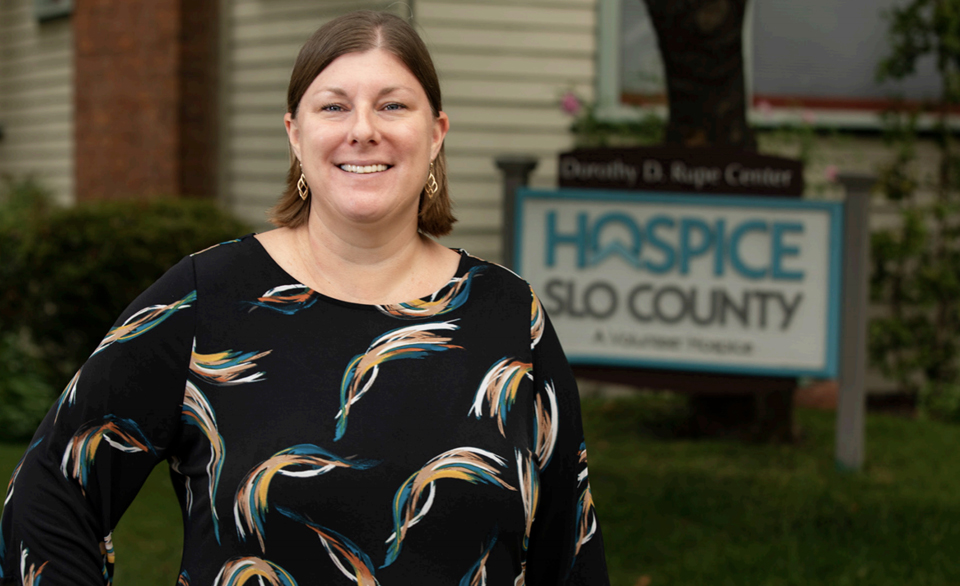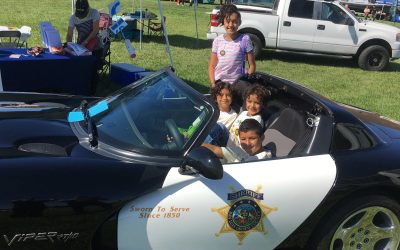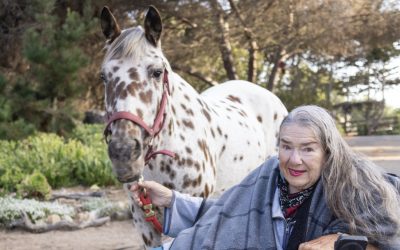“The end of life deserves as much respect as the beginning.” That’s the tagline for our own Hospice of San Luis Obispo County (HSLO), and for new Executive Director, Shannon McOuat, it has an especially powerful meaning. Her mother, you see, died of cancer in 2009, just five weeks after the birth of Shannon’s first child. The last time her mother was well enough to leave her house was the trip she took to the hospital to hold her first grandchild. For McOuat, it was a brutally painful experience to be grieving the loss of her mother while celebrating the arrival of her son. In retrospect, the juxtaposition of life and death has become a truly beautiful memory.
In July of this year, McOuat took the reins of the top job at Hospice of SLO County when her predecessor, Kris Kington-Barker retired. Stepping into the job with excellent credentials and a wealth of personal and professional experience, McOuat said she accepted the appointment with “Equal parts pride, excitement, and terror!”
“These are unprecedented and challenging times,” she said, refer- ring of course to our current coronavirus crisis, and admitting that the extra responsibility is nerve-wracking. But McOuat is well-prepared and well-supported.
A San Luis Obispo High School graduate, Shannon McOuat earned bachelor’s degrees from both Chico and Humboldt State. She then traveled the world with a backpack in search of another community to call home, but the pull of the Central Coast called her back.
“I married a local boy and we planted roots in Los Osos where we now raise our three boys. It is important to me that I model for my children what supporting and engaging in a community looks like,” she said.
Hospice of SLO County’s Board of Directors Chair, Terry Housinger, said this: “We feel extremely fortunate to have someone of Shannon’s caliber ready to fill the role that has been so well developed and executed by Kris Kington-Barker.”
Filled with gratitude for the mentorship, confidence, training, and support she has received from Kington-Barker during the transition (and before), McOuat said that Kris’s impact is best described by this quote from Eleanor Roosevelt. “A good leader inspires people to have confidence in the leader; a great leader inspires people to have confidence in themselves.”
“Kris is a visionary leader,” McOuat continued. “She’s compassionate, determined, selfless, and wicked smart. Her philosophy is to hire good people and then get out of their way.”
During her decade as Executive Director, Kington-Barker launched two programs that McOuat points to as being great examples of her vision. They are well worth noting because of their usefulness to anyone dealing with end of life issues—and eventually, that’s all of us!
The first is the Pet Peace of Mind program. This allows clients to complete their end-of-life journey with the comfort and companionship of their pet, without worrying about its current or future needs. Volunteers do tasks such as feeding, walking, grooming, and vet visits that clients may no longer be able to do. The program also assures that a loving home will be found for the pet when their owners can no longer be with them.
The second is the End of Life Doula program. McOuat explains it this way: “Just as a birth doula brings greater comfort and deeper meaning to the process of labor, our end-of-life doulas offer the same level of support to the dying. The program provides non-medical,
Trained through the International End of Life Doula Association, volunteers do not replace the services of a medical hospice or home health palliative care. Rather, they enhance it by providing an additional layer of support and more hours of bedside coverage for the family.
Which brings us to an important, and sometimes misunderstood, distinction: The difference between a medical hospice and a non-medical hospice.
Hospice of SLO County was founded in 1977 as a nonprofit, all-volunteer hospice based on the intensive social model that started in the 1960s as a grassroots movement. It provides non-medical in-home respite care, emotional support, practical assistance, and comfort to individuals, their families, and caregivers who are coping with a life-limiting illness, end-of-life, or grief. All services are offered free of charge.
Medical hospice agencies grew out of a dramatic shift in the U.S. hospice movement during the 1980s when Medicare-certified programs arrived on the scene. The Medicare benefit limits services to the final 6 months of life and Medicare patients give up their private doctors and shift from curative treatments to a focus on comfort care exclusively. Medical hospice staff includes specially trained doctors and nurses who can provide medical care, manage medications, etc. Some also offer social workers, support groups, grief counseling, music programs, spiritual care, and other services.
The non-medical hospice is not bound by time limitations, nor that your condition meets federal Medicare requirements. “In short,” McOuat explained, “we can start providing support for a potential client at the time of their life-limiting diagnosis. For example, we may work for years with an ALS or Alzheimer’s patient. And we can also serve those who continue to choose chemotherapy, radiation, or surgery with a curative focus, and all clients can retain their doctors.”
And there’s another important distinction. With regard to grief counseling and bereavement follow-up, a volunteer, non-medical hospice has no statutes of limitation, meaning services are always available to anyone coping with the death of another, regardless of when, where, or how the death occurred.
Today, there are only 23 non-medical hospices left in the U.S. “Our community is incredibly lucky to have two types of hospices,” McOuat said, “medical and non-medical, who can collaborate together to offer a full spectrum of support.”
As she prepares for the challenges of her new position, McOuat is ever mindful of the COVID-19 pandemic and the importance of keeping everyone safe. “I am really proud of how quickly, successfully, and creatively we were able to move to virtual and physically distanced support,” she said. For example, individual and group counseling are being offered virtually; volunteers are providing phone calls to clients and caregivers; they deliver supplies such as groceries and personal protective equipment; and they walk dogs and meet people for distanced walking and that all-important, in-person connection.
“I believe that due to COVID-19 there is an ever-present and palpable fear of death and dying,” said McOuat. “Many people are facing the possibility and reality of their own death for the first time.
With so many choices and chores to be done to prepare for death, it can feel daunting, even overwhelming. Hospice SLO County can help educate, support, and guide people through the process.
But they can do none of that without our support. Because it is non-medical, HSLO depends 100% on community donations, fund-raising events, grants, bequests, and planned gifts. The pandemic has caused the cancellation of fundraisers, forcing them to find more creative ways to find funding through grants and major gifts. So recently, they launched the GEM (Gifts Every Month) program to help them budget from month to month. And the Lightkeeper program is for those who can pledge a multi-year donation of $5000 or more. Please visit hospiceslo.org and click on the tab marked Giving to find out more.
More than anything, McOuat wants us to know that hospice care is about living. “It’s not just about dying or for when there’s nothing more to be done,” she said. “We help people focus on living as fully as possible for as long as possible. We envision a community that recognizes death as a part of life, where dying and grieving are embraced as natural; where all have access to support services without charge; and where no one dies or is left to grieve without comfort.”





